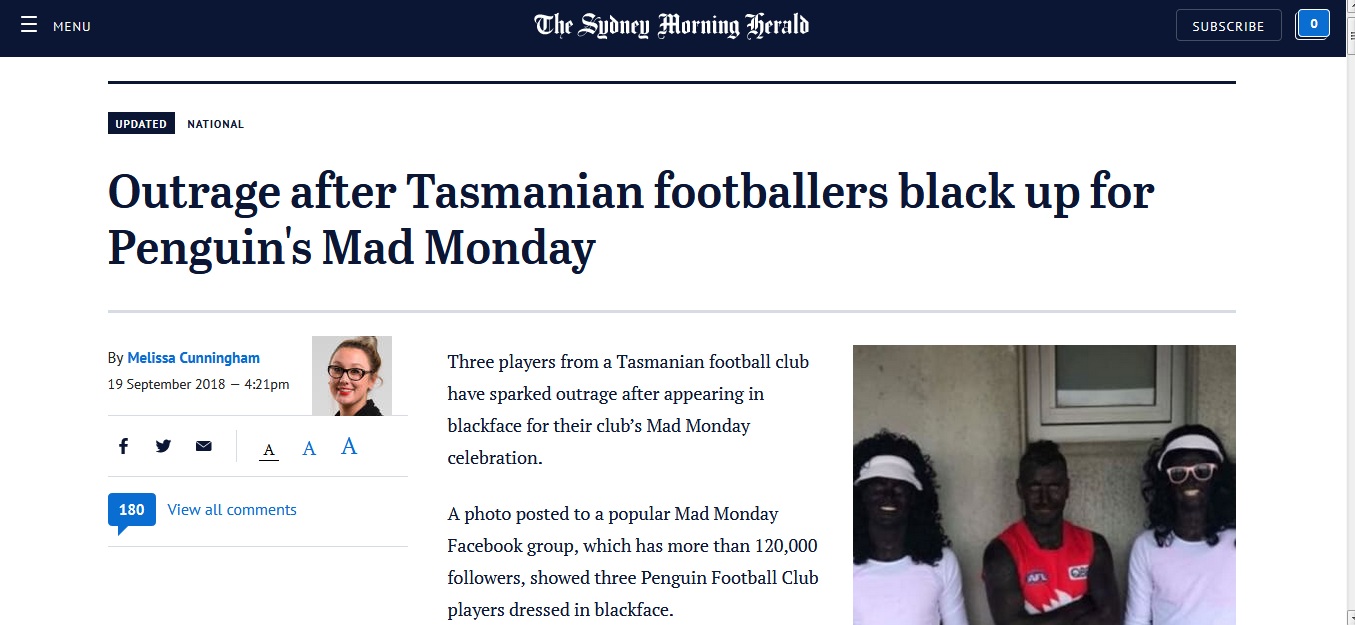
Two were dressed as star tennis sisters Venus and Serena Williams and the third as Kenyan-born Sydney Swans defender Aliir Aliir.
The club released a statement on Wednesday night apologising for the players’ conduct and said the incident occurred on end of season footy trip to Rocky Cape Tavern.
“The Penguin Football Club were not aware that three of our players intended to dress in this manner and the incident did not happen at our facilities,” the statement said.
“The Penguin Football Club would like it acknowledged that it is unacceptable in this day and age that three players would consider dressing for a Mad Monday as they did.
“It was not their intention to upset anyone and all they meant to do was dress as one of their sporting idols. Their actions were never intended to be racist in any way.”
The statement added that the players have been reprimanded and will be given support to make sure they understand that their behaviour was “racist and hurtful”.
“The players concerned have acknowledged that what they did was completely and utterly unacceptable and would like to apologise unreservedly for their lack of judgement,” it read.
“Sometimes players make mistakes and for that we apologise.”
The image has since been deleted from the Facebook page and the players’ personal profiles.
The players involved in the incident did not respond to The Age’s request for comment.
AFL Tasmania, however, deplored the players’ behaviour.
“It is not acceptable behaviour and we vehemently disapprove of it,” it said in a statement.
“We will be working with the league and club to get more information and to see how we can assist in providing education for the players.”
Associate Professor Naomi Priest, an expert on racism and health from the Australian National University’, said blackface was “dehumanising” and reinforced negative stereotypes.
But she said despite the overwhelming evidence of racism’s harms, the message that blacking up was wrong didn’t seem to be getting through.
“There is overwhelming evidence that this sort of stereotyping can be incredibly harmful to children, young people and to the wider community,” she said.
Last week, Herald Sun cartoonist Mark Knight caused an international storm with his depiction of Serena Williams throwing a tantrum during the final of the US Open last weekend.
Knight published his reaction to Saturday’s US Open women’s final – and in doing so, was seen by some to have caricatured Williams in a racially strereotyped way.
Blackface controversies have popped up quite frequently in Australia in recent years. In 2016, Opals basketball team member Alice Kunek apologised after posting photos of herself in blackface.
A photograph of Kunek, dressed as rapper Kanye West for the Melbourne Boomers’ “Silly Sunday” celebrations, was posted on social media, prompting a furious public response, including from Opals star Liz Cambage.
A mother who painted her son’s skin black for a school Book Week parade also caused viral outrage on social media in 2016 for a moment she described as a “parenting win”.
In her post, shared on social media by outraged parents, the mother said her son had wanted to look like his “idol”, AFL footballer Nic Naitanui.
The Frankston Bombers also apologised after posting images of teammates in blackface.
The football and netball club came under fire after posting pictures of the players dressed up for an ‘iPod shuffle night’, which included some who painted their skin black to appear as American rappers.
In 2011, Qantas was forced to apologise after encouraging two men to dress in blackface as Fijian-born Wallaby Radike Samo at a Bledisloe Cup game in Brisbane.
And in 2013, Cricket Australia was forced to issue an apology after tweeting an image of fans dressed like Indians with beards in colourful lycra, appearing to resemble English left-arm spinner Monty Panesar.
“How many times do we need to have these conversations?” Professor Priest asks.
“Many Australians have been saying for a long time that racism is an everyday experience and is embedded within the structures and institutions of our society and that it needs to change.”
“The frequency of these incidents raises serious questions about the extent to which our society is addressing issues of race and racism. It’s not an academic debate, it’s harming and dehumanising people.”
Dr Dvir Abramovich, chairman of the Anti-Defamation Commission, said the players’ conduct was “completely out of step with the Australian values of multiculturalism, inclusiveness and decency”.
“This shameful act is enormously disturbing, and will rightly shock the conscience of every Australian who will understand that these foolish players crossed many lines of decency,” he said.
“Spreading hate and promoting demeaning, hurtful stereotypes is not a game and is not funny. Imagine the pain an indigenous Australian, and many others would feel confronted with this expression of bigotry.
“It is our collective duty to send a resounding message that such attitudes have no room in our community.”
The Mad Monday Facebook group said when the post was seen by the page’s administrators it was immediately removed and the person who shared it banned from the page permanently.